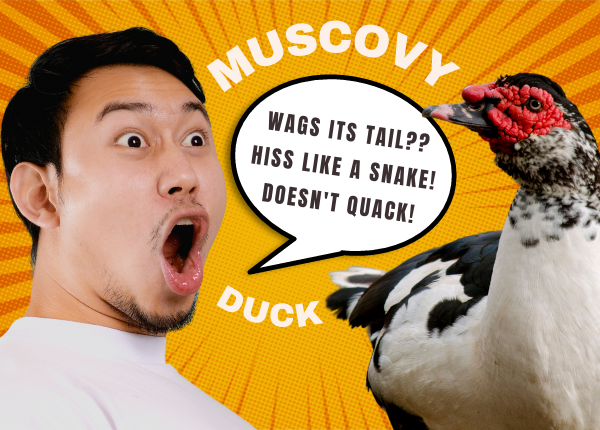
Muscovy ducks are weird and wonderful. They’re my kinda waterfowl.
What’s so weird about Muscovies? They look and fly like geese, have the facial features of a teenage turkey, live happily with chickens, roost in trees like birds, wag their tails like delighted dogs, and hiss like snakes when they’re threatened. Oh, and they don’t quack.
Muscovy ducks are so unique that we’re still squabbling over whether they’re even ducks or not!
Muscovy ducks are popular as pals for poultry because they’re so friendly and funny. They’re great options for homesteads and large gardens since they’re not as noisy as other ducks, they lay massive eggs, and their meat is the leanest duck meat on offer!
Most pet-people are quackers about these bizarre turkey-geese-dog-ducks (myself included) but not everyone is team Muscovy. Here’s why…
Wild Muscovy ducks take over fast when they colonize. They eat everything in sight, they’re big birds, and they poop big too! They can be destructive, messy, and play havoc with other species’ food chains.
As babies they are super-cute, but they grow up with the visual equivalent of duck-acne. They’re the opposite of the ugly duckling in the story. I think they’re still stunning, even with their turkey faces, but some people aren’t a fan of their distinguishing facial features.
When it comes to domestic Muscovies, we’re all a bit confused: are they precious and protected or are they pesky pests? Are they illegal to keep or do you need a license?
Let’s get to know the duck behind all the mystery and drama and find out what on Earth twacks and beans are?!
MEET THE MUSCOVY DUCK
- Are Muscovy Ducks Really Ducks?
- What are Muscovy Ducks Good For?
- Why are Muscovy Ducks Bad?
- Where Do Muscovy Ducks Come From?
- Where Did Muscovy Ducks Get Their Name From?
- Are Wood Ducks and Muscovy Ducks the Same?
- What Do Muscovy Ducks Look Like?
- What Varieties of Muscovy Duck are There?
- What Color are Muscovy Ducks?
- How Big Are Muscovy Ducks?
- How To Tell a Muscovy Drake from a Hen?
- What Do You Call a Group of Ducks?
- What’s a Mulard Duck?
- Are Muscovy Ducks Rare?
- Are Muscovy Ducks Protected in the US?
MUSCOVY DUCK EGGS
- How Many Eggs Do Muscovy Ducks Lay?
- How Big Are Muscovy Duck Eggs?
- Are Muscovy Duck Eggs Tasty?
MUSCOVY DUCK MEAT
- Is Muscovy Duck Tasty to Eat?
MUSCOVY DUCK TEMPERAMENT & BEHAVIOUR
- Are Muscovy Duck’s Good Pets?
- Can Muscovy Ducks be Kept with Chickens?
- Are Muscovy Ducks Broody?
- Are Muscovy Ducks Noisy?
- Do Muscovy Ducks Fly?
KEEPING MUSCOVY DUCKS
- Do You Need a Licence to Keep Muscovy Ducks in the US?
- How Long Do Muscovy Ducks Live For?
- Do Muscovy Ducks Have Health Issues?
- What Do Muscovy Ducks Eat?
PROS & CONS OF MUSCOVY DUCKS
- 10 Reasons Why Muscovy Ducks are Great
- 5 (or maybe 4) Reasons Not to Keep Muscovy Ducks
MEET THE MUSCOVY DUCK

Are Muscovy Ducks Really Ducks?
Muscovy ducks are indeed ducks, though they refuse to admit it.
As every other duck we know has descended from the Mallard (in techy talk, anas platyrhynchos) it seems impossible that a Muscovy can still be a ‘real’ duck. They’re so different. They’re closer to geese in looks and behavior, and they can’t be successfully cross-bred with a Mallard.
Muscovy ducks are ducks. They do have their very own classification though, of cairina moschata.
What are Muscovy Ducks Good For?
Muscovy ducks have great personalities, are beginner-friendly fowl, mix well with people - including kids, and can cohabit happily with chickens. They make great pets with perks.
Muscovies are dual-purpose production birds that lay jumbo-scale, tasty eggs, and they supply lots of lean, delicious meat.
They’re not the best at anything, but they’re good at everything. They can even climb trees, babysit eggs for less-than-broody birds of any species, and they’re great for pest control. They’ll even wag their tail when you get home from work. I mean, come on. For a duck, that’s cool!
Why are Muscovy Ducks Bad?
Feral Muscovy ducks can be the stuff of nightmares for homeowners in urban areas, including Houston, Texas, and Florida.
They eat practically everything and anything, and fowl foul on your windscreen is no joke! They make a lot of mess, and they can cause havoc with nature’s balance in local ecosystems like small ponds. Those not-so-popular poos can carry disease too.
“We consider Muscovy ducks to be undesirable in the wild because of their potential to transmit diseases to or interbreed with Florida's native waterfowl. Furthermore, Muscovy duck populations can increase quickly, which can lead to conflicts between neighbors, excessive nutrient loading in small ponds, and messy sidewalks and driveways.”(MYWFC)
Where Do Muscovy Ducks Come From?
Muscovy ducks originated as wild ducks in the American tropics, and some wild birds are still about in northeast Mexico in wooded rivers and swamps.
Where Did Muscovy Ducks Get Their Name From?
Muscovy means from the Moscow region, but they’re not from there. Hmmmm?
They might have got their name from the Muscovy Company, Moscovite, which first traded the ducks in London in 1555. which initially transported the ducks to England and France.
Are Wood Ducks and Muscovy Ducks the Same?
Muscovy ducks were domesticated by the Mexican natives long ago, and they were bred as domestic ducks in the different regions they’ve traveled to, picking up lots of regional names along their way:
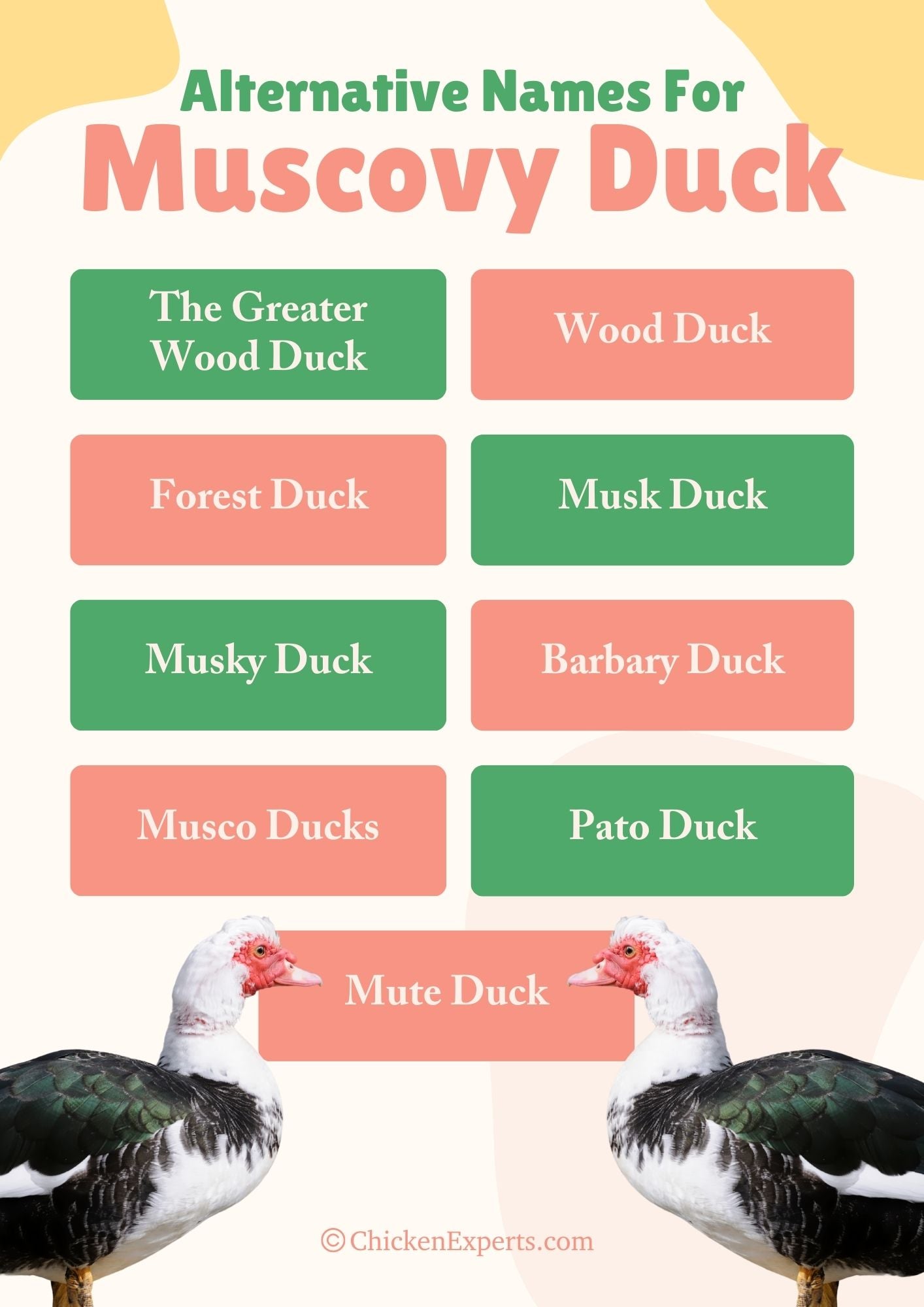
- Muscovy Duck
- The Greater Wood Duck (because they’re tree roosters)
- Wood Duck
- Forest Duck
- Musk Duck (abbreviation?)
- Musky Duck (they are a bit smelly…but this is a guess!)
- Barbary Duck
- Musco Ducks (because they eat Mosquitos)
- Brian (only joking)
- Pato Duck (Spanish)
- Mute Duck (Spanish)
What Do Muscovy Ducks Look Like?
You can’t miss them! Muscovy ducks are big, broad, and look more like a goose than a duck with their long necks. Muscovies have distinctive red bills and bumpy facial masks called caruncles, and broad, flat waggy (yes, waggy) tails.
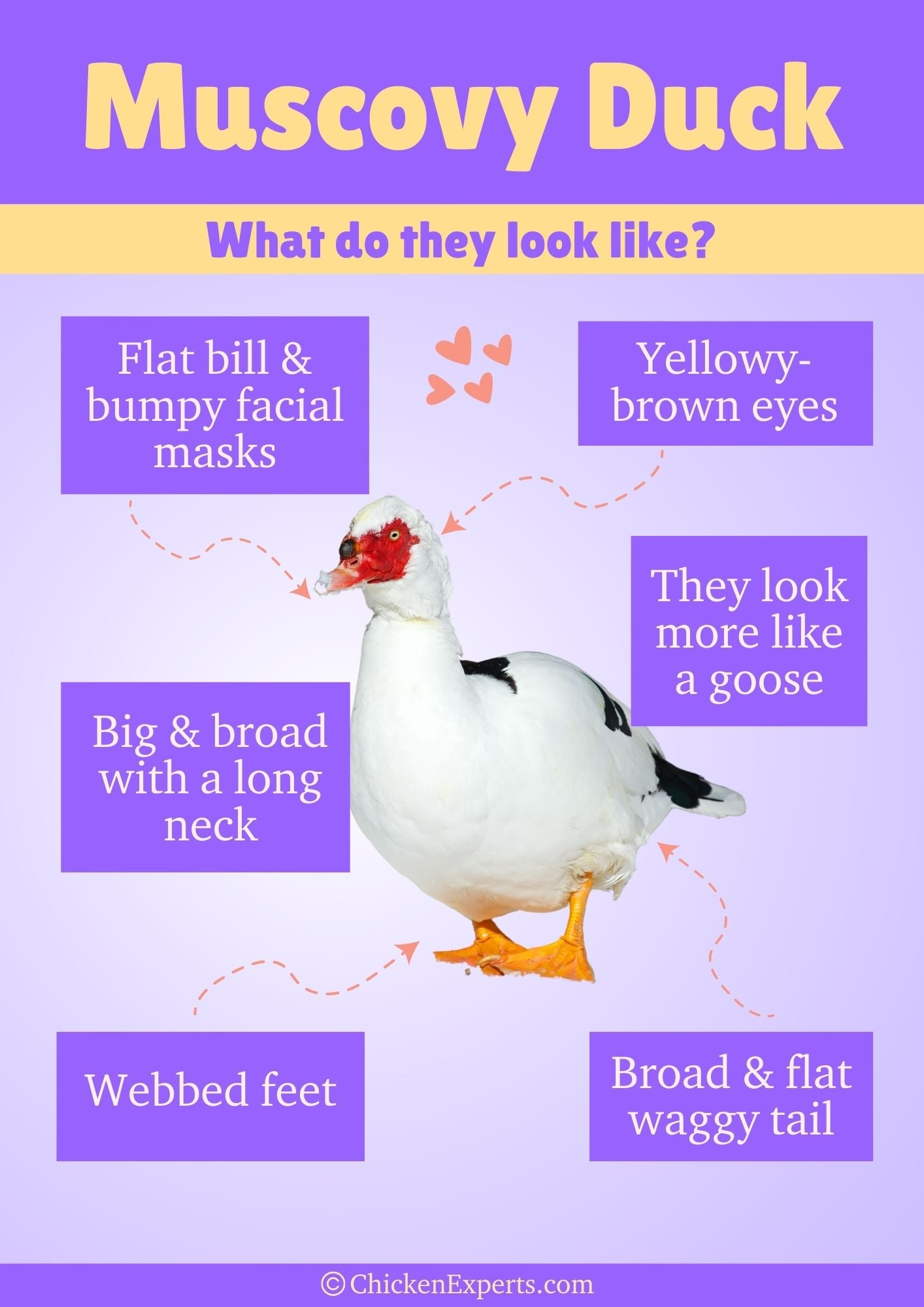
Muscovy ducks have wise eyes that are a yellowy-brown color with a nictitating membrane that lets them see underwater.
Their bills are flat and can be yellow, pink, black, or any combination of these colors. They can even have designer pink polka dots on them.
Muscovy ducks have unique feet. Their black webbed feet have long claws which allow them to swim and climb.
These fancy feet explain why they’re also known as the greater wood duck.
What Varieties of Muscovy Duck are There?
There are two subspecies of Muscovy duck: the wild Cairina moschata sylvestri, or royal ducks, and the domesticated Cairina moschata domestica, or Creole duck.
What Color are Muscovy Ducks?
Muscovy ducks first entered the American Poultry Association’s Standard of Perfection in 1874. Since then, lots of Muscovy color variations have been developed.
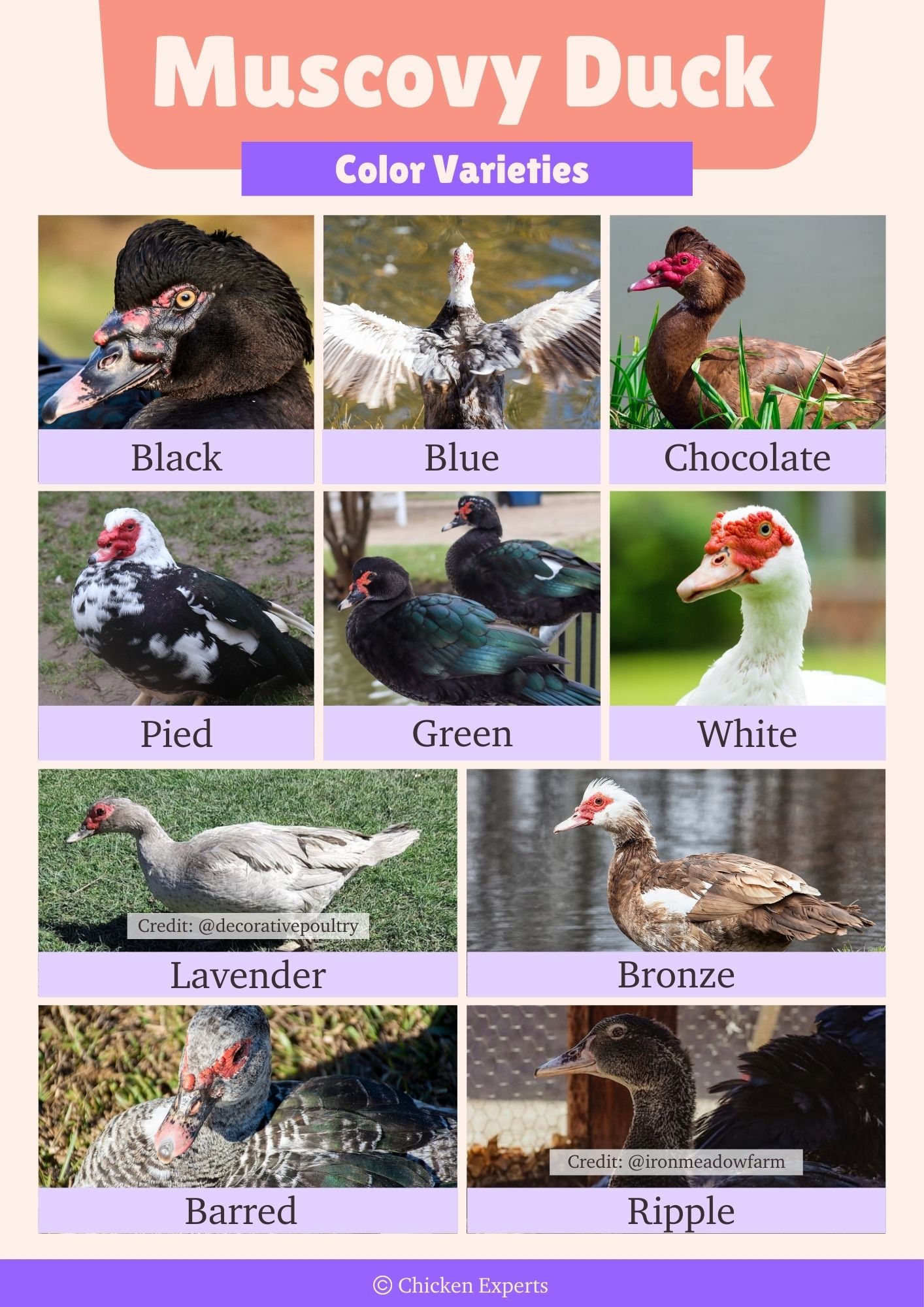
Generally, domestic Muscovies tend to be lighter in color than their wild relatives.
- Black Muscovy
- Blue Muscovy
- Chocolate Brown Muscovy
- Pied Muscovy (white with any other color)
- Green Muscovy
- White Muscovy
- Lavender Muscovy
- Bronze Muscovy
- Barred Muscovy
- Ripple Muscovy
How Big Are Muscovy Ducks?
Muscovy ducks are big! They’re twice the size of Mallards.
Domestica Muscovy drakes weigh 10 - 15lbs and measure 34 inches in length. They have mammoth wing spans of 54 – 64 inches.
Muscovy hens are smaller. They weigh 6-7lbs and grow to 25 inches in length.
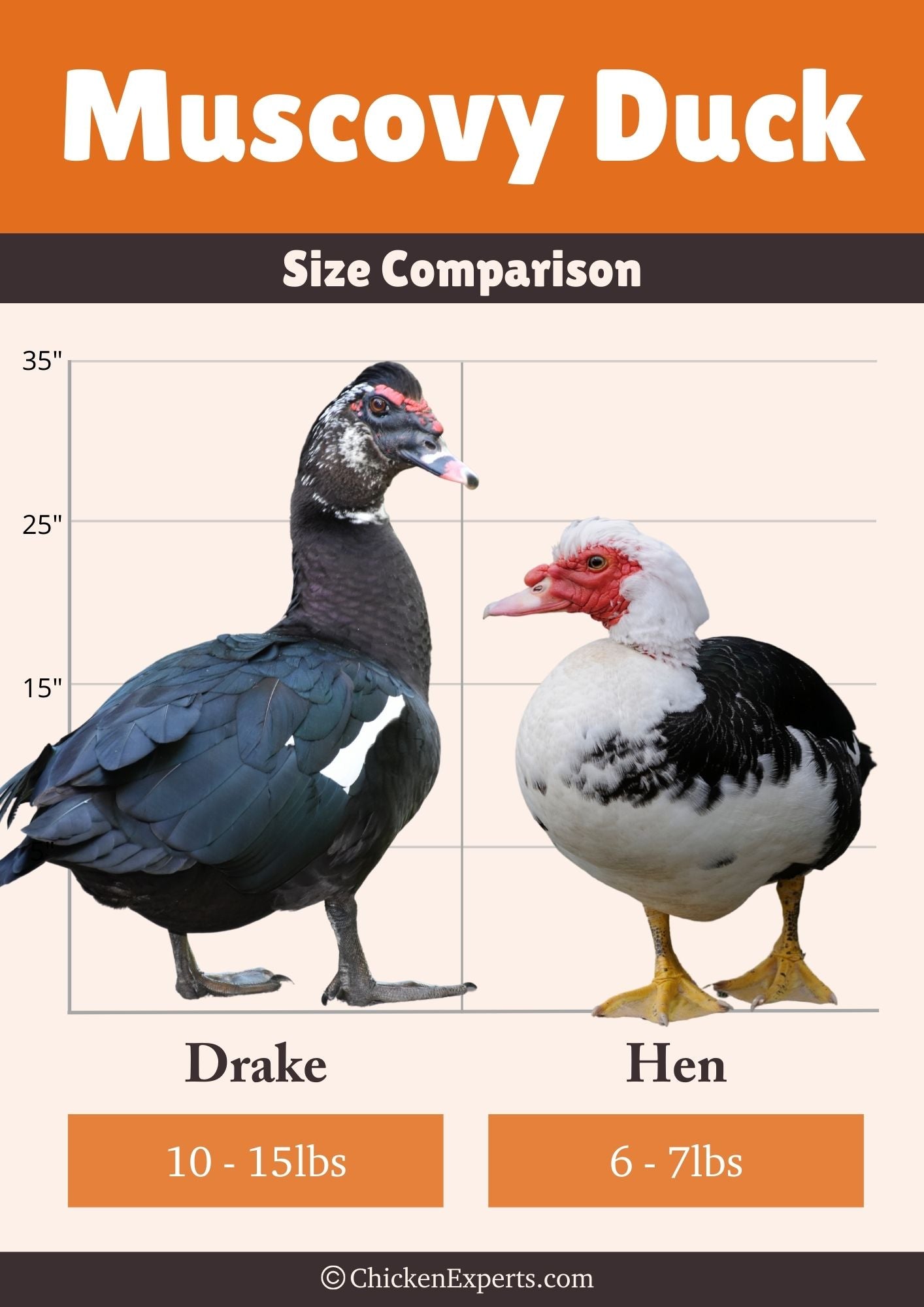
Wild Muscovies are smaller still at 2.4 – 9lbs since nobody is selecting them for their size.
The heaviest Muscovy duck on record was an Australian drake which weighed almost 22 lbs!
How To Tell a Muscovy Drake from a Hen?
Until your hen lays an egg, you’ll be counting on differences in appearance to know your Simons from your Sallys.
Drakes are larger in every way and their caruncles grow faster, larger, and brighter. The mature male will have a large dark red/blackish knob at the base of their bills called a bean.
Muscovy drakes have fancier feathers than their female friends, and their black feathers have an iridescent sheen to them.
Muscovy hens put their babies first and opt for pastels and nude outfits so they’re better camouflaged when they’re sitting on their clutches.
Muscovies have a crest of feathers on their heads, which is also bigger on the boys. They seem to know this and flash them around proudly in front of the ladies.
What Do You Call a Group of Ducks?
There are lots of cool words you can wow your waterfowl friends with:
- A group of duckings can be called a gaggle or a clutch.
- In the water, a group of ducks can be called a dopping, paddling, or raft of ducks.
- When they’re in flight you can call them a plump of ducks, and when they’re on land you can call them a Badelynge of ducks.
- Whatever they’re up to you can call them a flush, flock, team, badling, sord, or even a twack of ducks.
What’s a Mulard Duck?
What do you get if you cross a Muscovy duck with a Mallard duck? You get a Mulard, obvs!
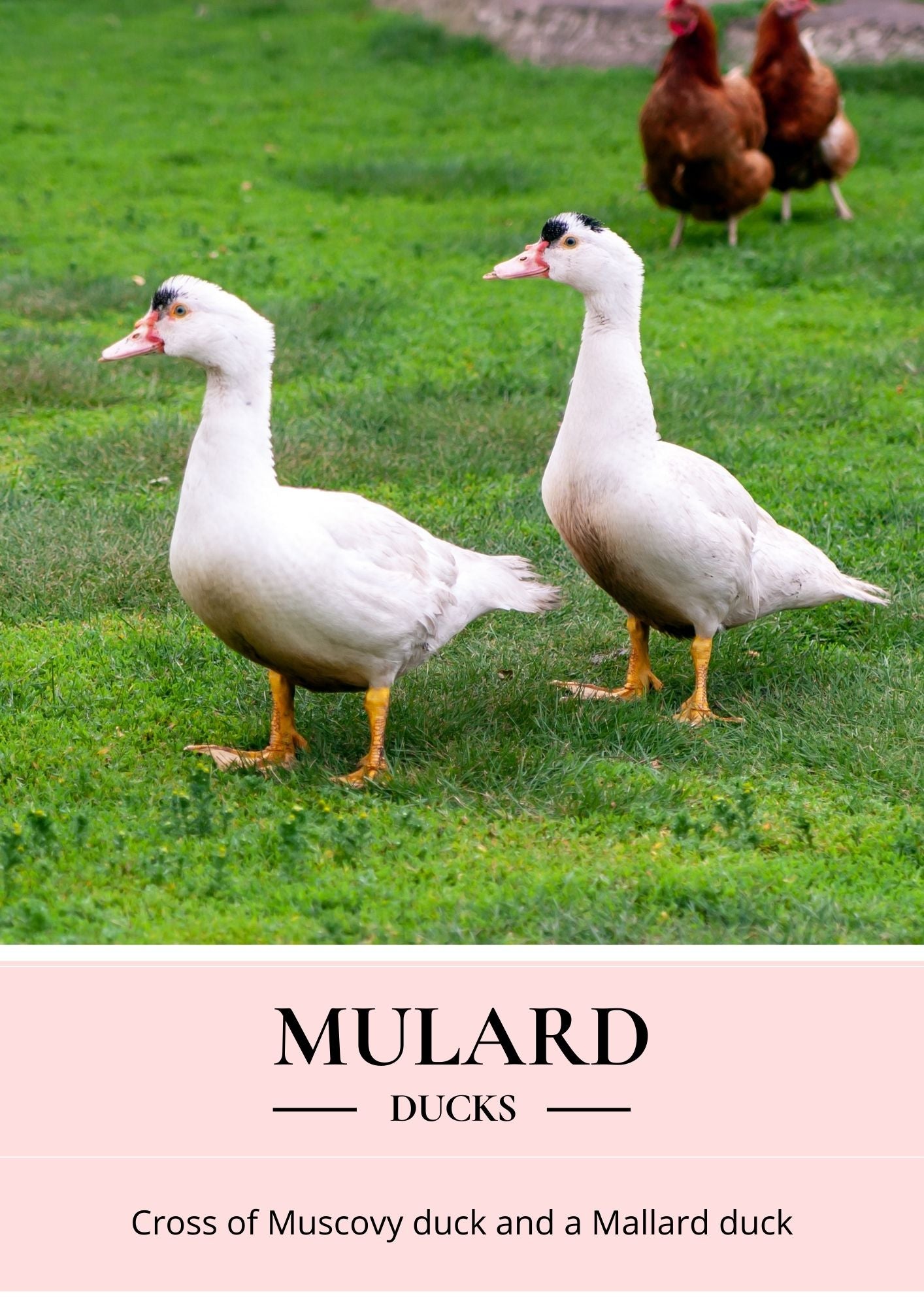
Muscovy drakes don’t tend to go for Mallard hens: they’re just not each other’s types. But, when people get involved Mulards are sometimes raised for meat as they grow fast like Mallards and big like Muscovies.
Muscovies and Mallards are different species of waterfowl (yes…both ducks), so Mulards are mules.
Are Muscovy Ducks Rare?
Muscovy ducks aren’t rare. Some would say the opposite, that there are too many of them now.
Are Muscovy Ducks Protected in the US?
Muscovies have limited federal protection as they’re considered to be an invasive species.
Since 2010 Muscovy ducks have been under federal protection in just three Texas counties that border Mexico since Muscovies are considered native there. Everywhere else in the US, wildlife management agencies and homeowners (so basically anyone) can ‘manage’ Muscovy numbers if they consider them to be problematic.
This right to manage numbers applies to wild and free-ranging Muscovies, so if you don’t keep your beloved pet ducks in a row, your neighbors do have the right to act.
It’s ALWAYS illegal to treat ducks cruelly, so ‘managing’ their numbers means capturing, contraception, and egg addling (terminating the chick early), not cruelty in any form!
MUSCOVY DUCK EGGS
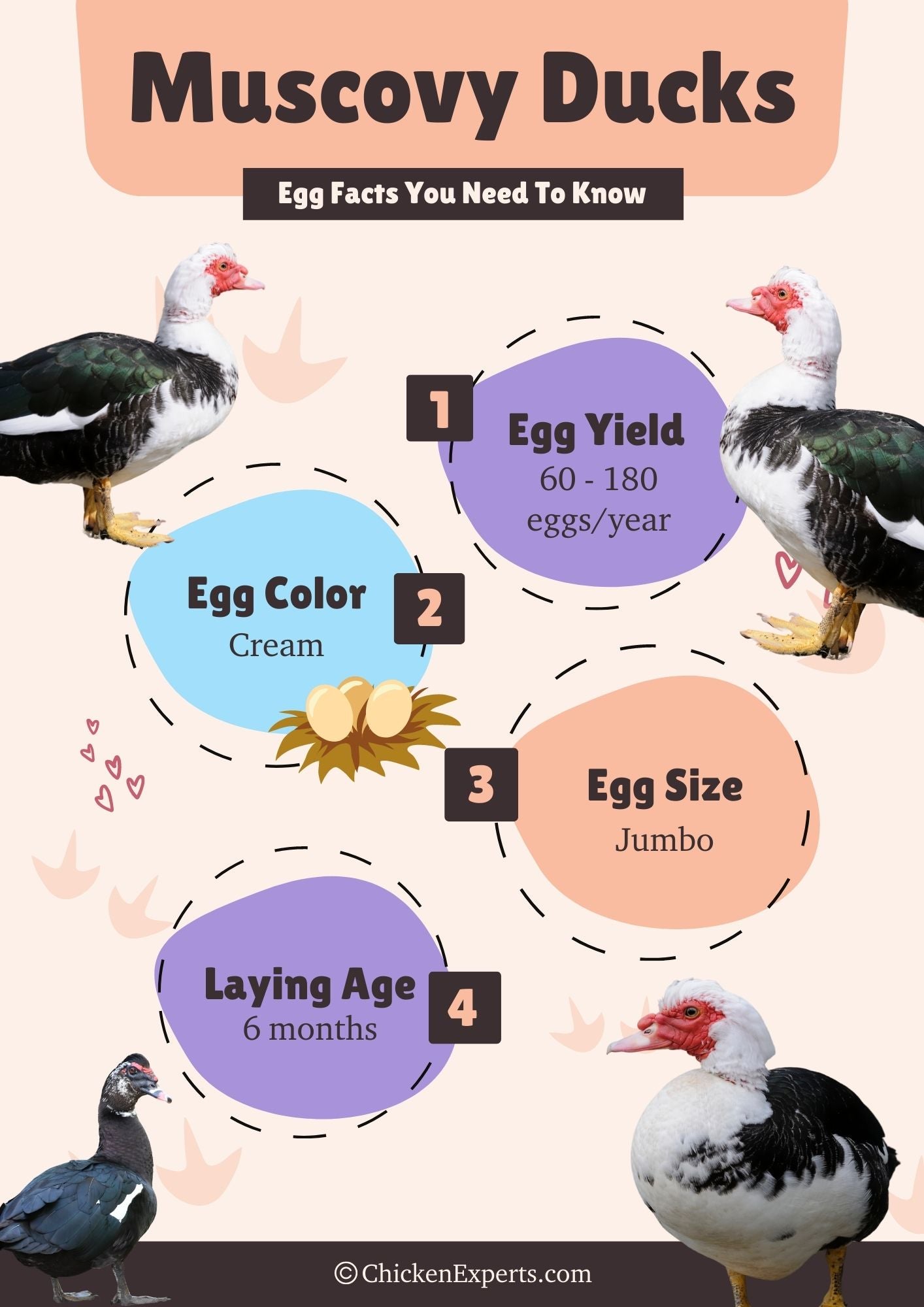
How Many Eggs Do Muscovy Ducks Lay?
Muscovy hens lay 60 to 180 eggs a year, whereas Mallard ducks lay an average of 300. Muscovies will also start laying later than other ducks or chickens will, at around 6 months of age.
How Big Are Muscovy Duck Eggs?
Muscovy Eggs are Jumbo-sized eggs, weighing 65 to 85 grams. They make up for their lower egg quantities with quality!
Are Muscovy Duck Eggs Tasty?
Muscovy eggs are huge, rich, and delicious. They're cream in color with a harder shell than most duck eggs and they contain more albumin than chicken eggs. This makes for fluffier pastries!
MUSCOVY DUCK MEAT
Is Muscovy Duck Tasty to Eat?
Muscovy duck meat is tasty, lean, and delicious. In France, 90% of the duck consumed is thought to be Muscovy! Whilst Muscovies are slower to mature than Mallards and cost considerably more to feed, they have a lot of plus points:
- Muscovies are sizey birds, so there’s a very decent meat yield
- Muscovies have 50% more breast meat than other ducks
- Muscovy meat is 98% fat free, so is one of the healthiest, leanest meats on the market
- Muscovy meat is lower in calories than turkey meat
- Muscovy meat tastes so good it’s compared to a sirloin steak, veal, or quality ham
MUSCOVY DUCK TEMPERAMENT & BEHAVIOUR
Are Muscovy Duck’s Good Pets?
Yes, Muscovy ducks can make great pets. They’re calm and collected, and even the massive drakes are softies. They won’t hop up on your lap for a snuggle, but they’ll wag their tails when you come to see them and enjoy your company and a fuss.
Can Muscovy Ducks be Kept with Chickens?
Muscovy ducks are the most popular ducks for mixed-species flocks because of their temperament. The fact they don’t quack, although quackers, is helpful for homesteads with noise-averse neighbors.
Muscovy hens like to use the vertical space in runs, and nest higher, so they don’t clash with chickens when it comes to real estate.
They’re not aggressive unless their babies are threatened, in which case your mama Muscovy can hold her own easily against the local cats, so don’t worry about that!
Are Muscovy Ducks Broody?
Muscovy hens are superb mummies. They can hatch 3-4 clutches of ducklings a year, and those clutches can be 10-16 eggs. Like I said – SUPERB mummies.
Muscovy mums are very protective, and they need to be since their babas take 33-35 days to hatch, compared to your chickens, who’ll peep out in just 21 days.
Muscovy hens believe in supporting each other. They love to co-nest and will appreciate large, raised duck houses that let them hang out together. They’ll happily hang out with Chicken mummies too…they’re all in this mummy thing together!
Muscovies become sexually mature at one year old. The drakes might scrap to impress the ladies: they haven’t caught onto the mating rituals and dancing that more civilized gents have mastered yet. Daddies are loyal to their babies and hang around to keep them safe, but they may have multiple wives.
Are Muscovy Ducks Noisy?
Muscovy ducks don’t quack. Drakes will hiss and puff to tell other drakes or predators to do one, and both sexes will chat and trill to say hello, but they make for quiet pets.
Do Muscovy Ducks Fly?
Females are flighty and like to roost up high in the trees. They fly with their necks held straight like a goose.
As the Muscovy males are so heavy, they can struggle to fly far.
If you keep Muscovy ducks at home they’ll need access to high roosting and nesting spots, they don’t do ground level at all. As the females can fly so well, you will need to clip their wings to prevent them from escaping and bothering the neighbors.
Do Muscovy Ducks Swim?
Muscovy ducks are ducks – whatever people may say! They don’t swim as much as Mallards as they have unusually small, underdeveloped oil glands, but they still need a body of water to release the oils they do have from their caunacules. A paddling pool will do them fine.
KEEPING MUSCOVY DUCKS
Is it Illegal to Keep Muscovy Ducks as Pets?
You can trawl the net for hours and still be scratching your head about this one!
On one hand, the 2010 protection regulations stated that individuals would no longer be allowed to keep these ducks as show animals or to produce eggs and meat. So, you could interpret that as, if you eat their eggs these animals cannot be kept as pets.
That’s not the case though.
You cannot sell or release (move) Muscovy ducks without a license, but you’re fine to keep them as pets and utilize their produce.
Do You Need a Licence to Keep Muscovy Ducks in the US?
You do not need a permit to own Muscovy ducks. I think these two quotes from the Florida Fish & Wildlife Commission help clarify the deal here;
“No permit is required to possess Muscovy ducks. However, both Florida Statute 379.231 and federal regulations 50 CFR 21.25(b)(8)(i) prohibit the release of Muscovy ducks, so they must be kept in a captive situation where they will not come into contact with native wildlife and will not escape captivity”
“Muscovy ducks are not native to Florida and are regulated as Class III wildlife, meaning a permit is required to possess them for exhibition or sale. A permit is not required to possess them as personal pets.”
How Long Do Muscovy Ducks Live For?
Muscovy ducks are long-lived with an average lifespan of 8-12 years and can live for up to 20 years in captivity.
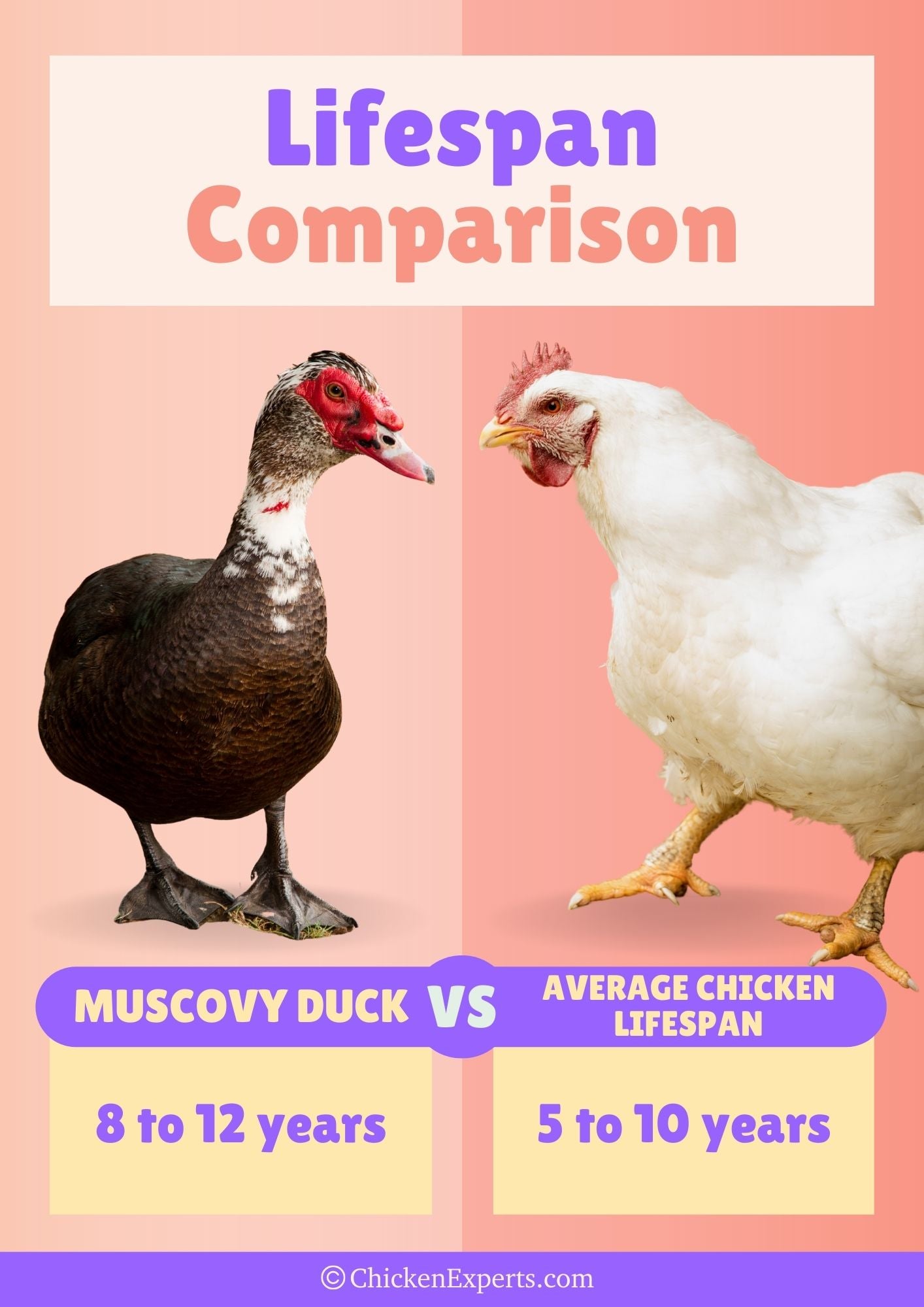
It takes around 24 hours for all Muscovy ducklings to hatch, then ducklings remain close to their mother for their first 10-12 weeks to stay warm. You won’t need an incubator: Muscovy mamas are dedicated!
In the wild Muscovy hens risk their own lives to protect their ducklings from predators and males stay close to the nest for several weeks to help watch over ducklings.
Muscovy parents don’t mate for life, though they do co-parent successfully. Ducklings are raised by both Mum and Dad and taught to hunt and forage before Dad moves on.
Do Muscovy Ducks Have Health Issues?
Muscovy ducks are very hardy. They can handle the hot and the cold, though ducks with very large caruncles can be prone to frostbite.
All ducks are at risk of duck plague (duck viral enteritis or DVE) but there’s a successful vaccine available in the US, so this can be given to ease your worries.
Muscovy ducks do seem to be more vulnerable to infections of bloodsucking parasites, so keep on top of your parasite management.
What Do Muscovy Ducks Eat?
Muscovy ducks aren’t picky. They are foraging omnivores with little regard for taste. They eat Mosquitos and rodents. They do not care.
If they’re able to forage freely then they’ll fend for themselves grazing on plants, weeds, leaves, roots, and shoots. They’ll get their protein hits from small fish, crustaceans, small reptiles, millipedes, and all sorts of bugs.
Muscovies are the perfect pest control! They’re one of the few species of waterfowl that will happily munch on mosquitoes and flies. They’ll also eat mice! MICE! Yes.
What Should I Feed My Muscovy Ducklings?
Muscovy ducklings need a 28% protein gamebird or waterfowl starter feed. Never feed ducklings medicated chicken feed, but you can let them eat non-medicated chick starter feed if you add some brewer’s yeast.
Growing ducklings require higher levels of Niacin than chicks, otherwise, they will grow up with severe vitamin deficiencies. It is possible to feed ducklings chick starter feed, but never feed them medicated chick starter. When feeding chick starter feed to ducklings, mix in brewer’s yeast at a ratio of 1 tablespoon to a cup of feed.
What To Feed Muscovy Ducks
Mature Muscovy ducks can eat a 20% protein feed, so flock raiser pellets, or layer pellets if they’ve shacked up with your chickens, are perfect.
If you’re raising domestic Muscovies then you’ll need to help them replace the nutrients that they can’t get naturally. Free-range Muscovies will always find a way to top up their protein levels with natural goodies, but you can treat them to mealworms, scratch, cracked corn, and fresh greens.
Why Do Ducks Need Brewer’s Yeast?
Ducks need more Niacin than chickens need. 1 tablespoon of brewer’s yeast in every cup of feed will avoid vitamin B3 deficiencies which are sadly quite common in growing ducklings.
You can up the ratios if you need to. Always keep some Brewer’s yeast on hand!
How Much Space Do Muscovy Ducks Need?
Muscovy Ducks aren’t right for small yards. Ideally, Muscovy ducks need a quarter acre to roam, 6-7 square feet per duck in a coop, and at least 15-20 square feet per duck in a run.
Muscovies thrive in wet woodlands. They’ll be happiest with dense vegetation or large, gappy trees to nest in, and they must have water.
Given the choice, Muscovy hens will fly high and roost 10-65 feet above the ground, though they’ll nest on the ground in dense vegetation near water if they’ve no other option. Give your Muscovy hens a very large duck house and they’ll likely choose to share with other hens.
PROS & CONS OF MUSCOVY DUCKS
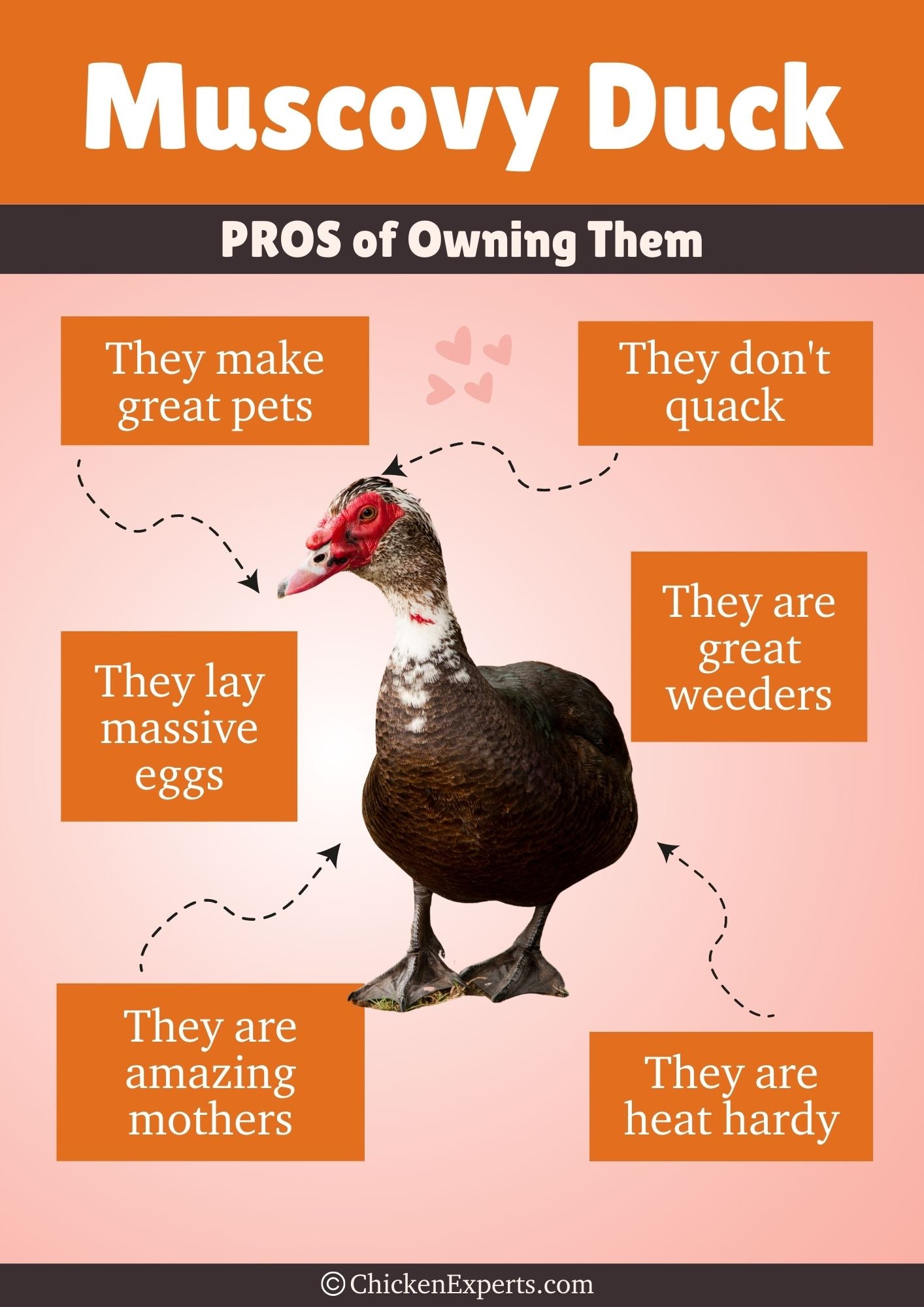
10 Reasons Why Muscovy Ducks are Great
1. Muscovy ducklings are cuuuuttee.
2. Muscovy ducks make great pets as they’re calm, collected, and love to be at (or on) your feet.
3. They lay massive eggs!
4. They don’t quack which should please the neighbors.
5. They’re great weeders and pest control agents.
6. They’re great mums and nannies.
7. They’re fairly problem-free and healthy.
8. They’re easygoing, even without time to train.
9. The drakes are friendly and even wag their tails when you come to see them.
10. They’re heat-hardy.
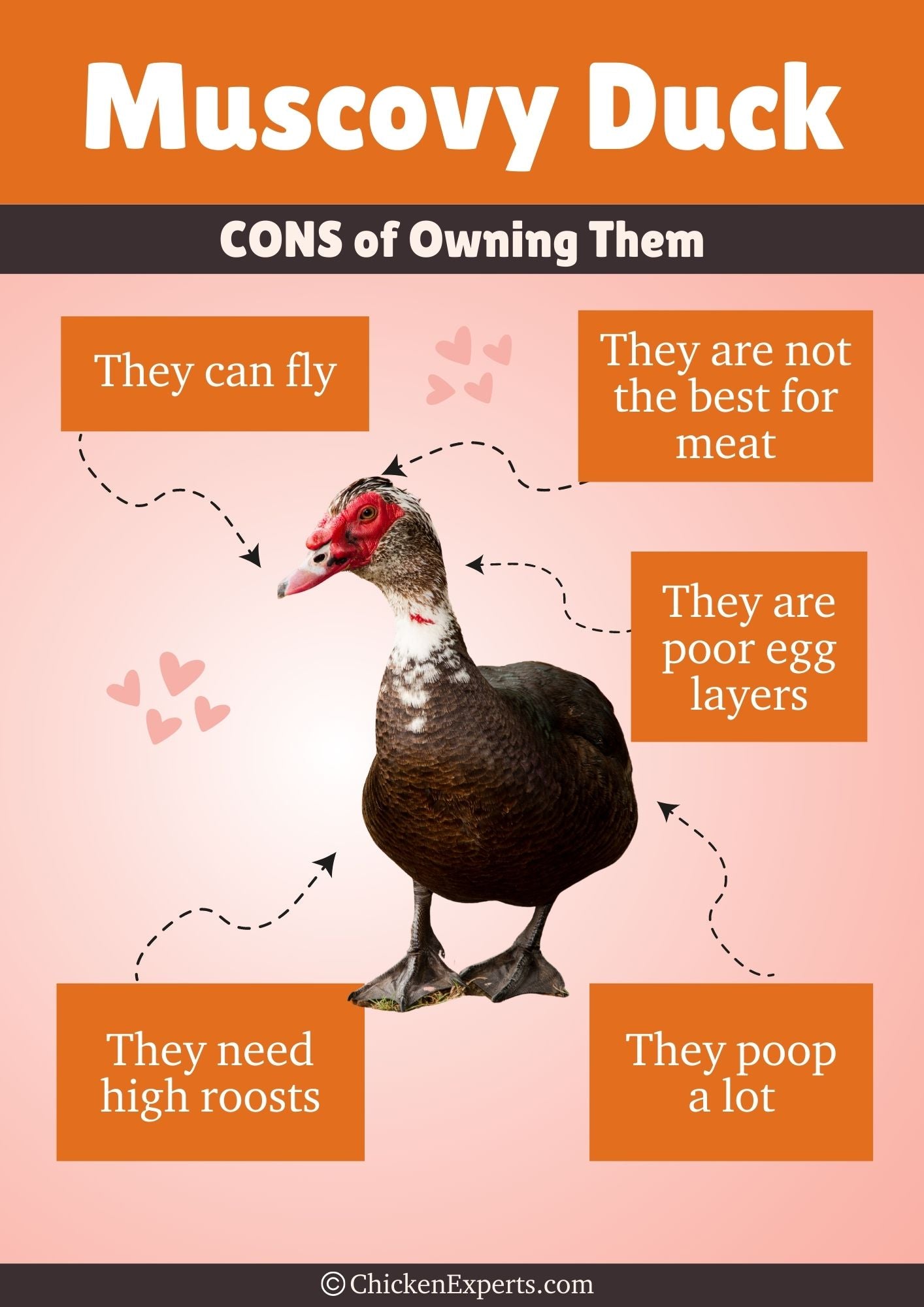
5 (or maybe 4) Reasons Not to Keep Muscovy Ducks
1. They’re not the best for meat. If you’re looking for an economical meat duck that matures faster then consider a Mallard or Pekin.
2. They’re not the best for egg quantities. If you’re looking for the perfect laying duck, then dodge the Muscovy and consider the Khaki Campbell or Pekin who will lay twice as many eggs for you.
3. They need some water and high roosts
4. They can destroy gardens and plants
5. Droppings can carry diseases, but this is the same for all ducks, so I’m not sure it’s fair to count this as a Muscovy ‘con’.
DUCKTAILS!
Tell us about your Muscovy ducks. Do you love them or loathe them? I bet you love them!
MUST HAVE A MUSCOVY?
If you’re looking for a waggy-tailed, goose-like, tree-climbing duck that’s a friendly pet and lays lovely jumbo eggs and will shack up happily as part of a mixed flock, that’s where Mrs Muscovy comes in!
Mixed flocks come with challenges: Where will everyone sleep? Can they share each other’s food? Will they eat each other’s eggs?!
You cannot duck the fact that keeping ducks, chickens, or any other pets need dedication and care. Make sure you get your ducks in a row before you bring home those fluffy ducklings! Check out Chickenpedia for the easy, expert, and trustworthy advice and tools you’ll need to make fowl-family life fun!


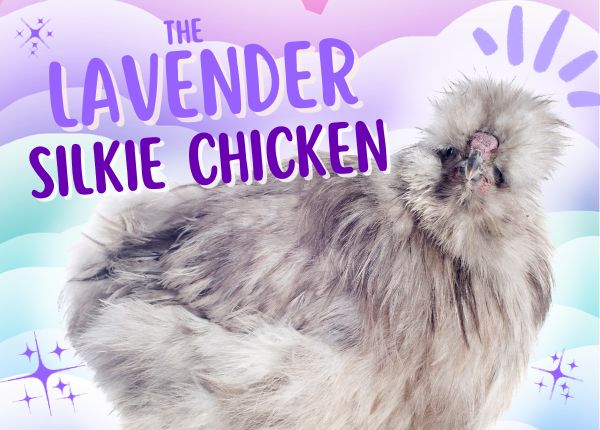
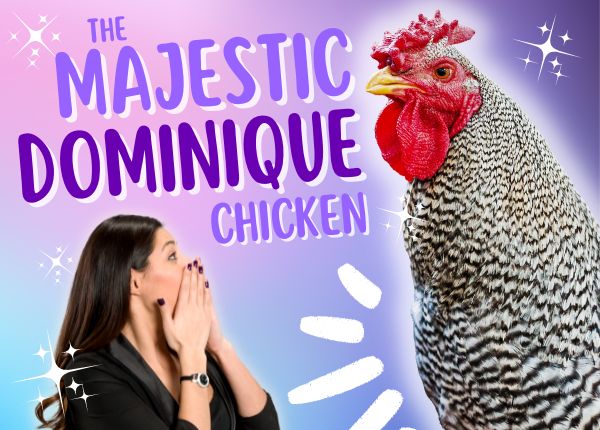







Leave a comment (all fields required)